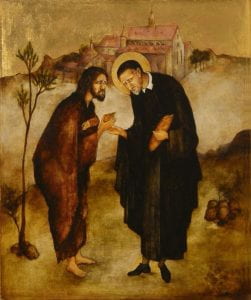
As has been the case during many former Lenten seasons, this year several groups of DePaul faculty and staff met on Zoom during a six-week period to participate in faith-sharing groups. Even though many of the group members had never before met, their time invited them to get to know colleagues on a much deeper level than activities of the workplace typically allow. During these sessions, we shared about the events of our lives in light of our faith commitments, and we prayed together as a community gathered together for the sake of a rich mission. While we may have started out as strangers, we soon became spiritual companions who travelled together on a unique journey, opening up about our lives and supporting each other during an intimate and sacred moment in time.
In many ways, this simple commitment to meet together and to share honestly aligned with the invocation of Saint Vincent, centuries before, to model truthful simplicity. Writing to a fellow priest, Vincent had implored, “Have the simplicity of a dove. This means giving a straightforward opinion about things in the way we honestly see them, without needless reservations. It also means doing things without any double-dealing or manipulation, our intention being focused solely on God.”[1] After all, “everyone loves simple, candid people, who don’t use subtleties or tricks, who are straightforward and speak sincerely, with the result that whatever they say comes from their heart.… they’re respected … esteemed by all.[2]”
Last week’s Mission Monday invited us to reflect on our human need to be in community and to feel cared for in good times and in bad. As I reflect upon what happened for me this Lenten season, our faith-sharing groups made manifest the best of “Take Care DePaul.” We showed up for one another. We listened and supported each other. At times, we gently challenged each other. We shared our truths, and we made meaning together. We trusted one another. And, if members couldn’t attend, we prayed for them and for the larger DePaul community. It was a form of spiritual accompaniment, a way of reminding each other that we matter, and the events of our lives matter. In a world that is so often defined by digital distance, this weekly coming together reminded us that we were not alone.
At its best, DePaul is a community that cares, and caring for the other is an integral part of working at a Vincentian university. Moreover, it is part of what it means to be human and is essential for human flourishing.
There are many experiences that may represent for us the best of DePaul. In the midst of the winter quarter, these groups were just one small manifestation of such an experience. They offered an opportunity to come together and listen to each other in a supportive environment of peers. This meant that for just a brief moment in time, we were able to share what was in our hearts and feel heard. It offered an opportunity to care and, in a spirit of mutuality, to experience being cared for by trusted peers. Engaging in such meaningful experiences has the potential to remind us that another world is possible, a world that is more caring and compassionate, in which all may thrive.
Reflection Questions
How might you/we create more experiences with colleagues that allow for deeper interpersonal sharing, support, and connection?
Think of a moment when you felt you were particularly well cared for at DePaul. Who showed up for you at that time? How have you paid this moment forward? What did that feel like?
Recall a time when you spoke the truth in the face of your own fears. What do you remember of this moment? What did you learn from it?
Reflection by: Siobhan O’Donoghue, PhD, Director of Faculty and Staff Engagement, Division of Mission and Ministry
[1] Constitutions and Statutes of the Congregation of the Mission, English trans. (Rome: General Curia of the Congregation of the Mission, 1989), 109.
[2] Pierre Coste, C.M., ed., Vincent de Paul: Correspondence, Conferences, Documents, ed. and trans. Jacqueline Kilar, D.C. et al., 14 vols. (New York: New City Press, 1985-2008), 12:142.